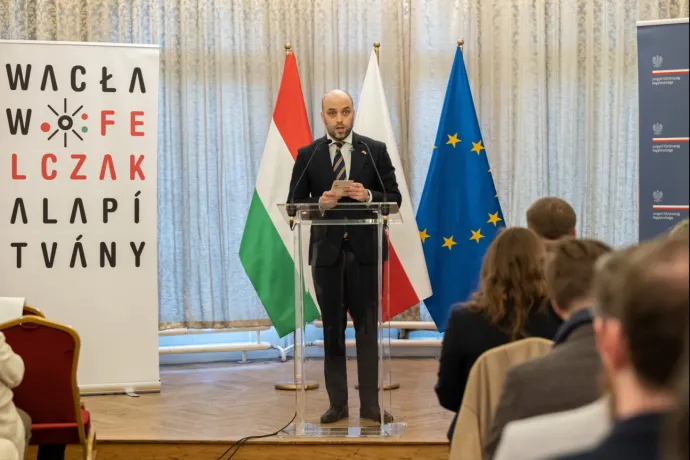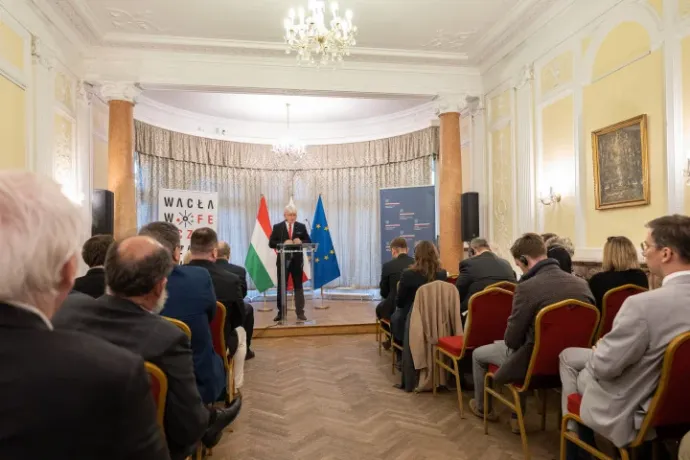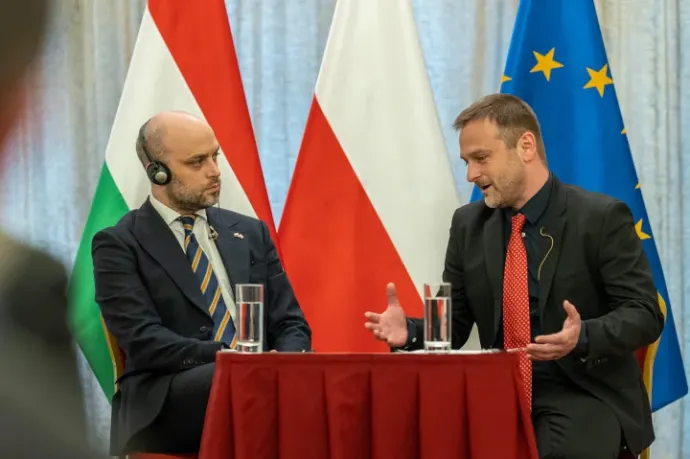Polish Ambassador: It is hard to see the Hungarian Foreign Minister's trips to Moscow

Nowhere else in the world do people understand the close ties between Hungarians and Poles, Poland's ambassador to Budapest, Sebastian Kęciek said, speaking at an event organized by the Wacław Felczak Foundation on Wednesday evening in Budapest. As a guest of the Foundation, the Ambassador Extraordinary and Plenipotentiary spoke with Miklós Mitrovits, the Poland expert of the National University of Public Service.
Despite the close relationship, the event focused on what currently separates Hungary and Poland – most notably their positions on the war in Ukraine. In recent months, we have written extensively about how the two countries' relationship has changed because of their diverging views. Warsaw is one of Kyiv's staunchest supporters – while Budapest often strikes a pro-Russian tone. Kęciek said there is a need for honesty and openness in the two countries' cooperation and for rebuilding the channels of communication both between the two countries and in the cooperation among the Visegrád Four.
"Our relationship was a close one, even when global conflicts put us on opposing sides, for example in the Second World War. People have always helped each other: the Hungarians could always count on the Poles, and the Poles on the Hungarians," the ambassador said in his opening remarks. "That's why we hope that a time of reflection and reopening will soon come – despite the signs of cooling that we are seeing right now."
Kęciek said that while it makes him sad that the Hungarian foreign minister keeps going to Moscow and Minsk for talks, in his opinion the Hungarian government remains a sincere partner, even if they do not agree with Poland on everything. However, the ambassador said that external forces are trying to disrupt the close relationship, which is exactly why he believes it should be strengthened "in a new chapter of cooperation".
An ambassador’s job is not just about making friends
"It is not difficult to see that Budapest and Warsaw disagree on crucial matters," Dr Karol Biernacki, Chairman of the Board of Trustees of the Felczak Foundation said in his speech. The foundation was established five years ago with the goal of promoting Polish culture in Hungary and expanding Polish-Hungarian relations.

According to Biernacki, the Russian aggression against Ukraine raises serious questions about the future – not only among politicians but also among ordinary citizens. "The media is not necessarily a reliable point of reference in this respect," the Polish Honorary Consul to Szeged said, adding that it was precisely for the purpose of clarifying these issues that the ambassador had been invited to the Felczak Workshop on Wednesday evening.
Sebastian Kęciek arrived in Hungary just a year ago, on 12 April, and took over the leadership of the Polish Embassy as Ambassador Extraordinary and Plenipotentiary a week later. He previously worked at the Ministry of Education and in the Cabinet of Prime Minister Mateusz Morawiecki, and actually wrote his thesis at the University of Krakow on the new Hungarian Constitution adopted in 2011. Although Kęciek arrived in Hungary a year ago, in the midst of a change of government and head of state, he said the handover was smooth thanks to his Hungarian colleagues.
"I particularly enjoyed this warm welcome, and I received the same honest answers from Hungarian state representatives that matched the honesty with which I spoke to them. After all, the ambassador's function includes shedding light on and discussing even the less friendly elements of the relationship."
– Kęciek said at the beginning of the interview, pointing out that he took up his post when the Hungarian government was already vehemently protesting against the sanctions against Russia, and Viktor Orbán personally criticized Ukrainian President Volodymyr Zelensky in his election victory speech.
Kęciek said that both he and Polish diplomacy as a whole had expected Orbán to change his position on the war in Ukraine after another two-thirds victory, but "this has not happened".
It's surprising to see what Hungarians think of the Russians
"Dialogue is ongoing, but it is not easy," the ambassador said. "If we look at the events of the last few days, when the Hungarian foreign minister visited Moscow and even Minsk – it is a difficult moment for us and for Warsaw." Despite this, he said, "bilateral and multilateral" discussions are ongoing and Polish diplomats are getting answers to all their questions from the Hungarian side, “although we are not always satisfied with these.”
The ambassador stressed that his is the role of mediator between the two countries, but he believes that the Polish position on the war in Ukraine is not really known or understood in Hungary. "I have read some commentaries and publicists who say that the Polish position is a kind of Russophobia, a kind of pro-Americanism. In fact, there were even some snide and ridiculing remarks, for example, under an article written by the Polish Prime Minister.
But that is not it at all: Polish foreign policy is rational and is based on our experience with the Russians. Hungary also has its own experience with the Russians, which is why it's surprising that the Hungarians have a different view of this."
– Kęciek said. When he was working in Prime Minister Morawiecki's cabinet as director for international projects around 2019-20, he and his colleagues already saw Russia as a threat to Eastern Europe. “Although not yet through military action, but even then, they were looking to hemorrhage Ukraine.”
Additionally, Russian services could actively operate in Central and Western Europe, whether it was the bombing of an arms depot in the Czech Republic or the strange murders in Berlin. "All along, the West believed that these things were not connected," Kęciek said. That's why, he says, Western countries didn't take it very seriously when Polish Prime Minister Morawiecki warned his partners as early as autumn 2021 that Russia would attack Ukraine.
“I say this without any sense of achievement, but rather as a bitter experience, that as the war escalated, the world finally woke up, sobered up and realized the threat that Russia presents.”
– the ambassador added, and also said that Moscow didn't expect the Western world to close ranks with Ukraine after 24 February 2022. But the European Union and the United States continue to support the beleaguered country, and the EU has already adopted its tenth package of sanctions against Russia. Kęciek also said that the fact that the Hungarian government has voted in favor of all the sanctions so far "should be appreciated".
Russia can only be stopped by working with the West
According to the ambassador, Russia will continue to pose a threat to its neighbors in the future, which is why the Hungarian government should reassess its relationship with Moscow. We will not be able to return to business as usual with Russia. People have experienced the same skyrocketing energy prices, especially in countries that do business with Moscow," Kęciek said, highlighting the examples of Moldova and Serbia, which depend heavily on the goodwill of Russia – and whose situation Moscow has been quick to take advantage of.
According to the ambassador, the diversification of energy sources is extremely important, which is why Poland would like to see Hungary more actively involved in regional projects. For example, the Gdańsk LNG terminal, from which gas could be transported to Hungary via Slovakia.
"45 percent of Hungary's gas supply comes from Russia. I believe that on the basis of common solidarity, we could secure this same amount of gas from elsewhere too – be it through pipelines coming through Croatia, Romania or Slovakia. There are more possibilities than we have managed to implement in recent years, and I was surprised that the Hungarian government was not quite open to considering these," the ambassador said. He added that Hungary's participation in the Three Seas Initiative is also much more limited than the benefits it could bring to the country – for example, Hungary isn't part of the initiative's Investment Fund (3SIIF) program, unlike Poland, Romania or the Czech Republic.
The Investment Fund is financed, among others, by the US – which could be a potential disincentive for the Hungarian government currently at odds with the United States. Of course, the Americans have their own answer to this: the US ambassador in Budapest announced sanctions against the Russian spy bank, which is partly owned by Hungary, at the same time as the Polish ambassador's event was being held.
Kęciek said he understood the Hungarian government's skepticism towards the West: "We have different historical experiences, but we see that, just like Poland, Hungary has had its disappointments with the West. However, only intensive relations with Western countries, and in particular with the United States, can provide a solution with regard to Russia", the Polish ambassador stressed.
External forces are trying to disrupt the friendship
The discussion also touched on the relationships among the Visegrád Four. Although the Polish prime minister said in March that he would rebuild Visegrád relations with Hungary, which have deteriorated since the Russian invasion of Ukraine, the Czech and Slovak governments are taking a much harder line on Hungarian foreign policy cozying up to the Russians. The Polish ambassador also stressed the need to revive V4 cooperation:
"In Poland, they say "it takes two" – in our case, it's a question of four. It is not only the Polish and Hungarian sides that need to be willing to do this, but also the Czech and Slovak sides."
– Kęciek said, adding that Budapest must first and foremost settle its relationship with Prague and Bratislava. However, he said that all four countries should have the will to continue the V4 cooperation, which he said could also play an important role in the future of the European Union. “The economic cooperation between the V4 countries is more extensive than that between Germany and Russia, or Germany and the United States. This is also a major weight within the EU, and as we are slowly catching up with the Western European countries in terms of prosperity, no one can look at us as second-rate partners any longer.”

Miklós Mitrovits also recalled a recently published survey by the Warsaw-based CBOS polling institute, which showed that along with the Czech and Slovak public, the Polish public's perception of Hungarians has also plummeted since the escalation of the war in Ukraine. The ambassador said he was here to build bridges. “I remember who Hungarians used to have to build bridges towards: the Romanians and the Slovaks, for example, because of historical grievances and ignorance. But not towards the Poles," Mitrovits said. Kęciek responded to the Poland expert's suggestion by saying that, of course, it is not necessary to build from scratch between Hungarians and Poles:
"My predecessors had it easier here, our relationship was different then. We did not foresee that we would find ourselves in such a difficult situation within such a short time. But I still believe that Hungary is a very important ally for Poland, especially on EU issues. We need to think about Hungarian-Polish relations in the long term, including new forms of cooperation, for example with an expansion to civil society. We need to build bridges of communication – despite the strong pressure from outside powers against this relationship," the ambassador said.
“I feel that there is an above-average sympathy between Hungarians and Poles, and this is something that will not be understood by other countries. I believe that this friendship will continue to function in this way in the future. It is true that a lot depends on the media and on politics, and it is important that we do not give ground to other, external forces. We need to open a new chapter in our relations with new ideas.”
The Polish stance is as easy as two plus two
At the end of the evening, Kęciek and Mitrovits opened it up to questions from the audience. One of them was what the ambassador thinks would bring the war in Ukraine to its end. “I can only respond with the shared Polish-Hungarian view of this, which is what Katalin Novák recently said about the matter in Turkey: the warring parties should end the fighting, and Russia should leave the territory of Ukraine” – Kęciek said. He added that if the cooperation of the EU and the United States in standing by Ukraine continues, Russia will back out. But should this relationship break, that would encourage Russia.
„All the while, Ukraine continues to fight heroically, and with the continued help of the West and the banking sector, they will be able to hold on. This is already a moral victory, which may give them further strength in this war”, the ambassador added. Kęciek said that although the Polish government’s view of the issue is „as simple as two plus two”, people must understand the magnitude of destruction that has gone on in Ukraine. „People were shocked by the news of the Bucha massacre, and the photos from there. But by today, we have almost gotten used to these things” – Kęciek said, adding that “Poland will support Ukraine as long as it is necessary.”
Another question from the audience brought up the fact that while the Ukrainian government practically treats the Poles as brothers and sisters, and Kyiv even put together a special legislation package relating to this, the Hungarian minority in Transcarpathia still doesn’t feel that its rights are secured. According to the Polish ambassador, this could partly be because the Polish government had already been discussing the measures affecting the Poles in the country with Kyiv for months before the escalation of the war, but the Hungarian government chose to throw loud statements around instead of initiating negotiations:
"I'd rather not comment on that, and it's not my intention to evaluate anything. But I would like to encourage the Hungarian side to negotiate with the Ukrainians on this, because the most important thing is to reach an agreement in the negotiating room."
At the same time, Kęciek also considers the issue of minorities important, and while he is happy that the situation of the Polish national minority in Hungary is settled, he also sees that this is still a challenge for Hungarians in Ukraine. However, he believes that the war could also bring Kyiv closer to Budapest in this respect: "We are mostly talking about Ukrainian citizens who were not forced to take part in the war, but volunteered to fight – like the university teacher from Transcarpathia who taught his classes from the front," the ambassador said, referring to Fedir Shandor, a professor from the University of Uzhhorod who is now serving near Bakhmut.
For more quick, accurate and impartial news from and about Hungary, subscribe to the Telex English newsletter!